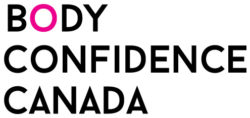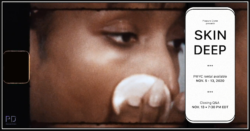Skin Deep
Skin Deep
Online program. PROGRAM EXPIRED. Skin Deep was available for PWYC Rental from Nov. 5 to Nov. 13, 2020
Program:
Quinceanera, Adriana López Garibay (Mexico, 2020) 11:04 min
Phat Girl, Rosemarie Wilson (USA, 2017) 8:13 min
In Search of Perfection, Leena Pukki (Finland, 2019) 16:25 min
Métis Femme Bodies, Chanelle Lajoie (CND, 2019) 5:52 min
Wash Day, Kourtney Jackson (CND, 2019) 9:52 min
Mirror Images, Revealing Self: Shifting perspectives on body and identification
Text by Yung-Lin Wang
What mirror images may show oneself to be beautiful?
It is difficult to trace the fate of beauty over any extended period of time, as beauty itself is an empty, ambiguous word. It is empty because, curiously, it can be measured: a beautiful size, weight, height, proportion, all are quantifiable. Of course, the frame of reference is a construct of those in power. On the other hand, beauty is ambiguous precisely because it is general and abstract. On this account, Elizabeth Grosz challenges the concept of the ideal body by stressing that, in fact, a variety of ideal body types must precede any one single ideal. Then, and only then, may the individual may aspire towards it—albeit in their own distinct way. As Grosz states, “Only when the relation between mind and body is adequately retheorized can we understand the contributions of the body to the production of knowledge systems, regimes of representation, cultural production, projection, and socioeconomic exchange.” [1] In this regard, Skin Deep as a curatorial project attempts to yield a meaningful space on the question of the scale of beauty. Comprising video works from five artists that address culturally, social-economically, and historically constructed insecurities, the programme reveals a simultaneous resistance to these insecurities: as a set of building blocks for the imagination of empowerment.
In her essay, Hey Girl, Am I More than My Hair?: African American Women and Their Struggles with Beauty, Body Image, and Hair, scholar Tracey Owens Patton indicates that beauty is subject to the hegemonic standards of the ruling class. In the article, she examines the beauty standards of both African American and White European women through historical and contemporary lenses alike. Patton argues that African American women fail to meet the societal “norm” and are voiceless as the result of the Euro-centric normality: their lack of light skin color and straight hair play part in rendering them powerless. Nonetheless, she asserts that hairstyling, as the freedom to make a political statement about body image, hair, and race, illustrates the possibility of transcending this interlocking system of domination: the liberation of black women may come with the redefinition of beauty. [2]
Issues of beauty and subjection to dominant standards, needless to say, do not solely play out in racial constructs of Black and white. In fact, the normality constructed by a homogenous order imposes subjugation on all who stand in front of the mirror. The entanglement of oppression and neglect—two components of subjugation—are beautifully but sorrowfully addressed in Kourtney Jackson’s Wash Day. In the film, three people are respectively presented in the shower rinsing, combing, and/or braiding their hair before presenting themselves. As their voices emerge over the sound of running water, the audience is invited to enter the small shower room—here also a story room—to intimately witness their individual suffering. Jackson describes the work as an attempt to communicate the dynamic of having to come home to these parts of your body, to dress and groom the “wounds” that society opens every day. As a Black person, she became aware that physical appearance (and the negative associations attached to it) precedes who you are as a human being. “As you develop the self-consciousness that comes with growing up and becoming aware of the different parts of your body, it can be even more disorienting trying to define your own truths when you’re constantly confronted with falsities others project onto you.” [3] She further states that black hair manifests in a variety of textures, colors, and styles, as do our individual experiences and perspectives, which establish us as unique individuals.
The twin representation of intimacy and confession can also be observed in Quinceañera, by Adriana López Garibay. Atop home video from her fifteenth birthday party (fifteen being a milestone in Latin American culture) the artist superimposes text from an inner dialogue brimming with anxiety and confusion, the tension between the celebration and her personal thoughts unveiling the destructive influence of mass media and social norms on her self-image. Memories of her young self, annotated by the current self, becomes her form of self-deconstruction, and a purging of detrimental affects -and also the influence of others? Mention something about that external input that she’s trying to escape?
But the mirror does not only reflect one’s self in the display. In Métis Femme Bodies and In Search of Perfection we see another kind of employment of the mirror image. Artists Chanelle Lajoie and Leena Pukki use the camera as the eyes of a third person’s perspective. Lajoie’s work traces histories of Métis women, to bear witness to their experiences either retroactively or in the present. The filmmaker presents these women in close-up, as so many body parts: legs, arms, ankles, backs….while we listen to them express their feelings about how “being Métis femme” informs their existence. Shifting hands, silent sighs, and quivering voices surface as these women share their experiences: trauma, insecurity, and other impositions of the hegemony. Lajoie additionally stresses on the cis-heteronormative identities: to be women, indigenous, or queer is to become a resilient collective force that opens a space “where the truth can exist, not to replace but rather, to remind ourselves and others that we are not solely meant to come from trauma, isolation, and insecurity”. [4] In contrast, in In Search of Perfection, Leena Pukki, who was trained as a sculptor, molded her face and proceeded to interview four plastic surgeons to inquire how she might “measure up” to mainstream beauty standards. In consequence, the figure of the protagonist’s face is animated during the film in accordance with the surgeons’ criticisms: the process of manufacturing beauty. By this action, the face of the figure goes through, in her words, a “standardizing process.” [5]
Finally, PHAT Girl by Rosemarie Wilson addresses an empowering message about exuberant bodily confidence manifested by a troupe of fabulous women of size. Her parody of commercial advertisements presents an alternative, paving the way for a more inclusive register of beauty. The artist points out that societal fatphobia causes people severe stress and mental health issues from stigma and stereotyping. Sizeism also results in discrimination and systemic violence against fat bodies in access to medicine, employment, and exclusion from public spaces that do not accommodate all bodies. Her goal with this work, which uses spoken word, music, and performance, is to create a positive and uplifting message promoting the concept of PHAT, which stands for “Pretty, Hot, And Tempting.”
The definition of beauty is never fixed, as the idea itself is highly unstable. The five works in Skin Deep suggest the different representations of mirror images: self-reflection, the third-person perspective, and message carrier. The works not only bring personal and collective trauma into the light, and therefore into dialogue—they also re-deploy the body image and the politics lurking behind ‘beauty’.
[1] Grosz, Elizabeth. Volatile Bodies: Toward a Corporeal Feminism. Bloomington: Indiana University Press, 1994. p.19
[2] Patton, Tracey Owens. “Hey Girl, Am I More than My Hair?: African American Women and Their Struggles with Beauty, Body Image, and Hair.” NWSA Journal, vol. 18, no. 2, 2006, pp. 24–51.
[3] From the interview with Kourtney Jackson.
[4] The quote is captured from the interview with Chanelle Lajoie.
[5] The quote is from the interview with Leena Pukki.
Skin Deep is curated by Pleasure Dome’s Board Director, Clare Samuel, with a curatorial essay by Yung-lin Wang.
Image credit: Wash Day, Kourtney Jackson (Canada, 2019)
Become a Pleasure Dome Member
What does your $10 membership support? Truly, the intrinsic values of arts programming are varied and complex. Your membership allows us to contribute to the intellectual and critical understanding of experimental media through writing, discussions, screenings, essays, and interviews. In turn, our publications and engagements improve arts literacy, critical engagement, and intellectual curiosity in the sector, and in the public. Your membership allows us to support the production, presentation, and interest in radical and utterly experimental moving image work. Importantly, your membership allows us to provide reputable, professional, and paid presentation opportunities for the exhibition of marginalized works.


